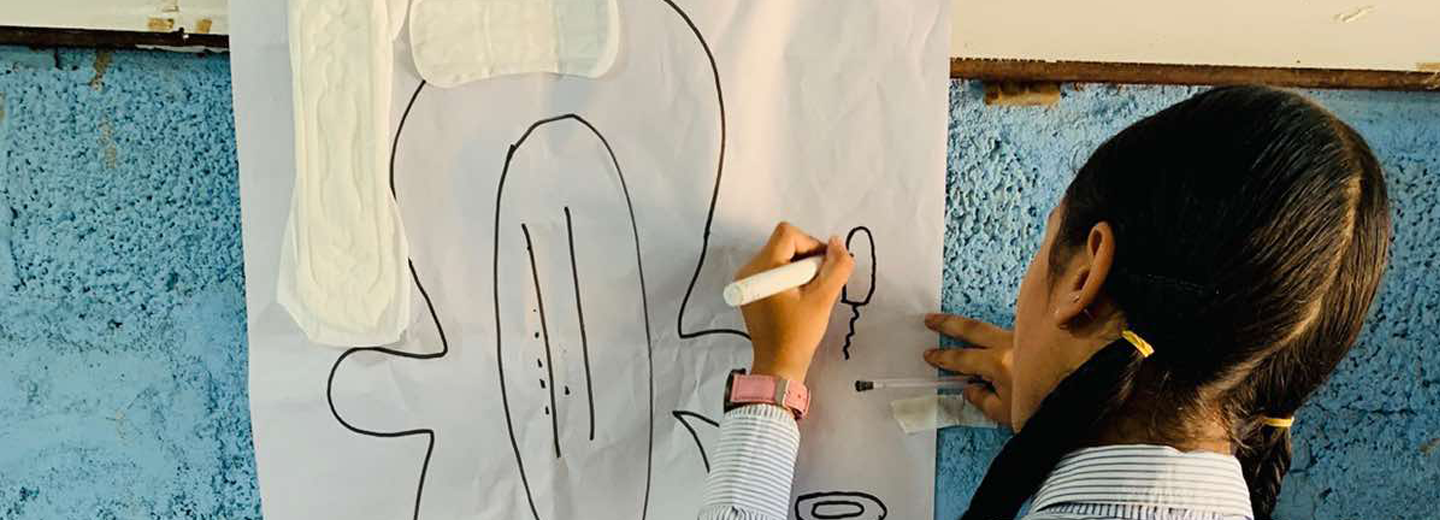
Year: 2018-2019
Supported by: GIZ-S2HSP Nepal
Major component: Menstrual health, menstrual health friendly school, inter-generational dialogue, advocacy
MenstruAction is a holistic approach to make menstruation safer and healthier for women and girls, by reaching out to key gatekeepers and decision makers in the community. The project was implemented from December 2018- November 2019 with support from GIZ Nepal - S2HSP in 30 schools (both public and private schools) of Bidur Municipality, Nuwakot district.
This project unleashed adolescents as “social champions” for sustainable development through the introduction of reusable sanitary products to the girls and development of a sense of responsibility in the girls and the gatekeepers towards their environment, communities and school. Realizing how concerted efforts are needed to identify MHM needs, this project also aims to incorporate the voices of adolescent girls and boys in ways most appropriate to their respective engagement channels and specific challenges to transformative gender in schools.
What made this approach unique was that adolescents were part of decision making and able to influence gatekeepers and decision makers as they were members of the MenstruAction Committee. Also, instead of a blanket approach, menstrual health management needs of each schools was evaluated and action plans were developed that were specific to the needs of the particular school. MenstruAction brought together all relevant stakeholders ward leader, school management, teacher and adolescents to take decisions for menstrual health management.
Building ownership of Bidur municipality towards the issue of menstrual health was the focus, and so regular meeting and engagement with municipal and ward leaders was integrated since the inception and throughout the project. This led to highlighting the issue during municipal meetings, leaders speaking out in various platforms, municipality designing and allocating its budget for MHM programs and stronger commitment for the issue.
A 4 days residential training was conducted in 2 batches for 60 adolescent boys and girls from 30 different schools in Bidur. The training focused on developing technical skills (knowledge on menstrual health management, local governance), advocacy skills and dialogue session conduction skill. The social champions then conducted activism and advocacy activities for a whole year in their school and community.
As part of the initiative, MenstruAction Committee was formed in each of the 30 schools compromising of the School Management Committee members, ward representatives, school teachers and an adolescent girl and a boy identified by the schools themselves who were then oriented on their roles and responsibilities.
The social champions conducted a total of 60 peer dialogue sessions and 54 community dialogue sessions among their peers and members of the community on topics of changes during puberty, physiology of menstruation, products to be used for menstrual health management and menstrual health friendly school. The main aim of the dialogue sessions was to initiate discussions on menstruation and break the silence around the topic.
In each school, the social champions jointly identified the menstrual health friendliness score of their school, and the major gaps, on the basis of which they jointly prioritized actions tailored to their school.
An emergency stock of MHM management items listed by the committee was distributed to each school and a seed grant to implement their prioritized action was provided. This included improving infrastructres like installing fixing door locks, water tanks, basin, dress changing facility, waste disposl facilities; increasing capacity for pad making; stocking of items like sanitary pads, dress to change in case of stain, medications, pain management, percolators, mattress and blankets etc. To enhance informed choice, reusable sanitary pads, tampons and menstrual cups were introduced. School also conducted day celebrations and contests on the theme to promote discussions about MHM.
Sharing meetings within MHM Committee in each school, among various schools, and with ward and municipal leaders were organized regularly to enhance learning.
Through 60 peer dialogue sessions and 54 community dialogue sessions, a total of 2765 people were reached (males: 1091 and females: 1674) and conversations on menstruation were initiated with them. The peer dialogue sessions conducted among the students in the schools focused on creating awareness on menstruation process, products available in the market and also starting conversations on the importance of a menstrual health friendly school. The community dialogue sessions conducted with parents, teachers, ward leaders were done to understand how two generations viewed menstruation and also to find a common ground to overcome menstrual stigma and discrimination.
The menstrual health friendliness of schools had improved by 22% after the completion of the project activities. 40% of the schools had used the seed grant for water supply management which includes installation of taps, maintenance of basins, installation of basins, 20% had focused on repair and maintenance of the existing facilities such as locks on the doors, 46.67% had focused on cleanliness management such as purchase of cleaning materials, installation of dustbins while 10% had focused on creating a resting room space which had hot water bag, blanket, hot water.

212/48 Dhapasi Marga, Basundhara, Kathmandu, Nepal
phone : +977 9847697791
Email : mail.visim@gmail.com
Website : www.visim.org
Visim envisions creating visible impact on lives of every girl, every woman and every youth by unleashing the social and economic leadership of girls, women and youth through beneficiary-partnered innovative interventions.